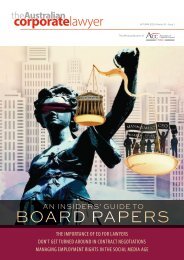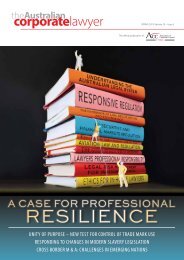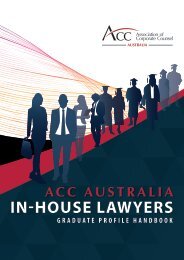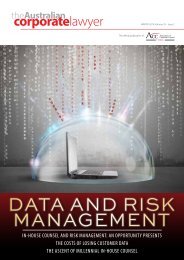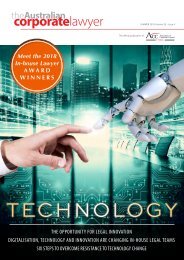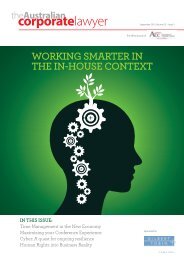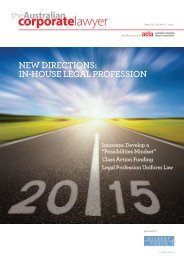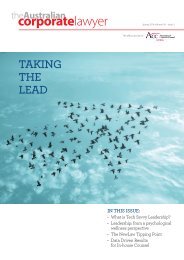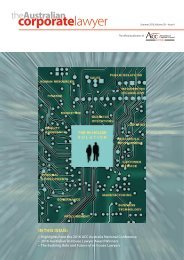Australian Corporate Lawyer - Autumn 2017
Australian Corporate Lawyer is the official publication of the Association of Corporate Counsel (ACC) Australia. The Autumn 2018 issue focuses on 'The Law and Technology' and features a range of articles covering topics including: the future of contracts and; the future of law firms as software companies..
Australian Corporate Lawyer is the official publication of the Association of Corporate Counsel (ACC) Australia. The Autumn 2018 issue focuses on 'The Law and Technology' and features a range of articles covering topics including: the future of contracts and; the future of law firms as software companies..
Create successful ePaper yourself
Turn your PDF publications into a flip-book with our unique Google optimized e-Paper software.
acla.acc.com<br />
PERSPECTIVES – JON DOWNES<br />
The impact of technological change for in-house counsel<br />
When it comes to accepting change,<br />
lawyers are often described as slow,<br />
or perhaps more politely, cautious<br />
to change. Yet when we consider the impact<br />
of technological change on the practice of<br />
law, recent history has revealed an incredible<br />
amount of change and we can no doubt<br />
expect that to continue into the foreseeable<br />
future. Regrettably for some, if lawyers don’t<br />
change and adapt, there is a strong case for<br />
arguing that in the words of Richard Susskind,<br />
from “The End of <strong>Lawyer</strong>s,” we will “struggle<br />
to survive.”<br />
Over just the last few years, significant<br />
“lawtech” developments have included the<br />
rise of predictive analytics, predictive coding<br />
and machine learning. The English High Court,<br />
just last year for the first time, approved the<br />
use of predictive coding in the large scale<br />
Pyrrho discovery case. An interesting example<br />
of Artificial Intelligence is IBM’s Watson,<br />
developed for medical prognosis based on<br />
data analysis and now being considered for<br />
legal applications. It’s not quite “Judgment<br />
Day” yet, but it seems the robots are coming.<br />
What does this all mean for in-house lawyers?<br />
Well, if we are to demonstrate value as a sector<br />
and to our individual employers, we must<br />
embrace technological change.<br />
In accepting technology as the new norm and<br />
leveraging it for our profession, I’d like to touch<br />
on three areas that I believe are key. First, in<br />
keeping external costs down, it’s important<br />
to understand how external legal service<br />
providers are using technology to become<br />
more efficient. That understanding should<br />
be a catalyst for us realising similar efficiency<br />
benefits by partnering with those service<br />
providers. Law firms can and do provide<br />
significant value, yet technology has given<br />
rise to new and different ways of deriving that<br />
value. We are no longer solely reliant on the<br />
traditional legal model. Emerging disruptive<br />
legal technology providers are offering<br />
new and compelling options. We have to<br />
understand the changes and manage that<br />
value to take advantage.<br />
Secondly, with an inward focus, just as law<br />
firms are using technology more and more in<br />
respect of low value high volume work, so too<br />
should in-house legal teams. In my experience,<br />
the key to the success of an in-house legal<br />
team includes ensuring appropriate customer<br />
focus is maintained, eliminating unnecessary<br />
work and using the right tools. Increasingly,<br />
in-house teams are using metrics to measure<br />
performance in order to maximise efficiency.<br />
One “New Law” business I’ve seen has recently<br />
introduced an app to facilitate this. “Lean<br />
six sigma” methodology is being used to<br />
help ensure the legal team’s focus is more<br />
on the high value strategic work. Contract<br />
management software solutions are providing<br />
high quality and effective document creation,<br />
management and retention functionality<br />
at relatively low cost. There have also been<br />
technological advances in tracking external<br />
legal spend for large global legal teams.<br />
Furthermore, in-house lawyers are working<br />
more as a “community,” sharing resources<br />
through technology as a way to work<br />
more efficiently. Maintaining ACC Australia<br />
membership and utilising the ACC’s global<br />
resources is one example, as lawyers have<br />
access to templates, legal advice and a broad<br />
range of other legal work output that has<br />
been shared within the corporate lawyers’<br />
community. Technology is a key part of the<br />
solution for “doing more with less.”<br />
Thirdly, technological advancement means<br />
the businesses we work for are increasingly<br />
exposed to cyber security issues. As lawyers,<br />
we need to understand these issues to be able<br />
to advise our boards and C-suites on legal<br />
risk mitigation. We must be able to advise on<br />
matters such as insurance, business continuity<br />
and ensuring there is an adequate control<br />
framework. For example, what to do in the<br />
event of a data breach to mitigate the risk of<br />
reputational harm and litigation.<br />
As technology and the law changes, as<br />
in-house lawyers, we too must change in<br />
order to continue to earn our place as trusted<br />
legal advisers.<br />
Jon Downes<br />
With over 20 years’ experience in the financial<br />
and services industry, gained across both major<br />
law firms and the corporate environment,<br />
Jon is a trusted advisor to businesses with a<br />
commercial and strategic focus.<br />
In his current role as the General Counsel and<br />
Company Secretary at Willis Towers Watson,<br />
Jon provides advice and support on a range of<br />
issues including managing legal and regulatory<br />
risk. Jon’s expertise includes managing legal<br />
and regulatory risk, insurance law, corporate<br />
governance, company secretarial and<br />
government relations.<br />
Jon is the President of the NSW Division<br />
of ACC Australia.<br />
Each month ACC Australia invites our in-house industry<br />
leaders to share their experiences and perspectives on the<br />
theme of the current issue of <strong>Australian</strong> <strong>Corporate</strong> <strong>Lawyer</strong>.<br />
VOLUME 27, ISSUE 1 – AUTUMN <strong>2017</strong><br />
5



